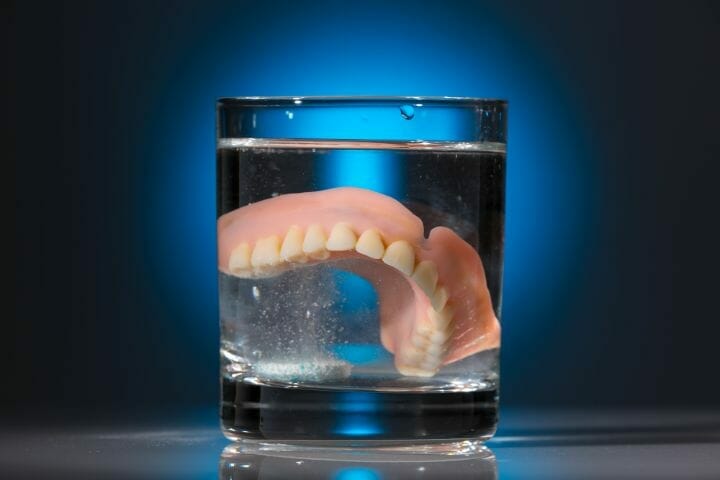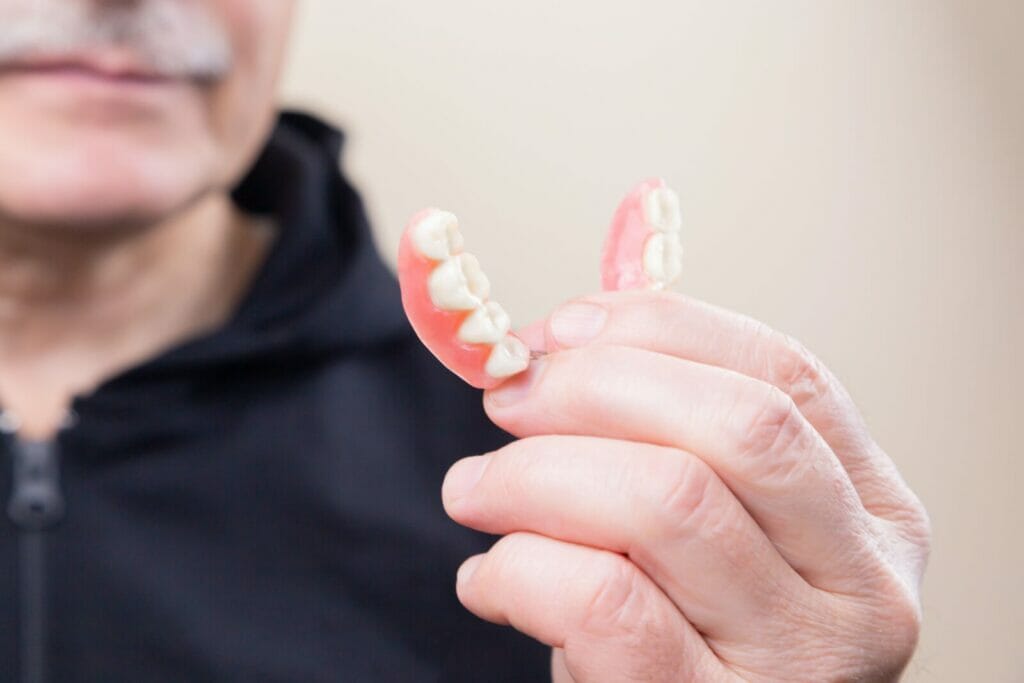
Dentures can be a life-changing solution for those who have lost their natural teeth. However, adjusting to life with dentures can be a challenge, especially when it comes to eating. Certain foods can be difficult to chew or may damage dentures, making it important to be mindful of what is being consumed.
Some foods that should be avoided with dentures include hard and sticky foods such as caramel, popcorn, and hard candy. These types of foods can cause damage to dentures or dislodge them. Additionally, foods that require excessive chewing, such as tough meats or raw vegetables, may also be difficult to eat with dentures.
It is also important to avoid extremely hot or cold foods and beverages as they can cause discomfort or damage to dentures. Proper care and maintenance of dentures are also crucial to ensuring their longevity. By avoiding certain foods and following proper care instructions, those with dentures can continue to enjoy a wide variety of foods and maintain their oral health.
Understanding Dentures
Dentures are prosthetic devices that are used to replace missing teeth. They are custom-made to fit the individual’s mouth and are designed to look and function like natural teeth. Dentures can be full or partial, depending on the number of teeth that need to be replaced.

When a person first gets dentures, it may take some time to adjust to them. Eating and speaking may feel different, and the mouth may feel sore or irritated. It is important to follow the dentist’s instructions for caring for the dentures and to schedule regular check-ups to ensure they are fitting properly.
It is important to note that dentures are not the same as natural teeth or dental implants. They may require different care and maintenance, and there may be certain foods that should be avoided to prevent damage or discomfort.
Some foods to avoid with dentures include:
- Hard or sticky candy
- Nuts and seeds
- Popcorn
- Tough or chewy meats
- Raw vegetables and fruits
- Corn on the cob
- Chewy breads and bagels
By avoiding these foods, individuals can help prevent damage to their dentures and ensure they last as long as possible. It is also important to maintain good oral hygiene by brushing and flossing regularly, even if some natural teeth are missing.
Overall, dentures can provide a new smile and improved function for those with missing teeth. With proper care and maintenance, they can last for many years and provide a comfortable and functional solution for those in need.
Challenges of Eating with Dentures
Eating with dentures can be a challenging experience for some people. While dentures can restore the ability to eat and chew, they can also cause discomfort and difficulty when consuming certain types of food. Here are some common challenges that denture wearers may face when eating:
- Sore spots: Dentures can cause sore spots in the mouth, especially in the early stages of wearing them. Sore spots can make it difficult to eat, particularly when consuming hard or crunchy foods.
- Uneven pressure: Dentures may not distribute pressure evenly across the mouth, which can make it difficult to chew food properly. This can lead to discomfort and difficulty when eating.
- Types of foods: Certain types of foods can be challenging for denture wearers to eat. Sticky foods, hard foods, and tough meats can be particularly difficult to chew and may cause discomfort or pain.
- Food particles: Food particles can get trapped between dentures and the gums, which can cause irritation and discomfort. This can make it difficult to eat comfortably.
- Hot foods: Hot foods can be challenging to eat with dentures, as they can cause discomfort or even burn the mouth.
- Hard candy and sticky candy: Hard candy and sticky candy can be difficult to eat with dentures, as they can stick to the dentures and cause discomfort or pain.
- Hard fruits and raw vegetables: Hard fruits and raw vegetables can be difficult to chew and may cause discomfort or pain.
- Excessive chewing: Excessive chewing can cause discomfort and may even damage dentures. Denture wearers should be careful not to over-chew their food.
Overall, denture wearers may need to make some adjustments to their diet in order to eat comfortably. It’s important to avoid foods that are particularly challenging to eat, and to take care when consuming hot or sticky foods. With practice and patience, most denture wearers can learn to eat comfortably and enjoyably.
Adapting to New Dentures
For new denture wearers, it’s a good idea to start with softer foods that are easier to chew and won’t put too much pressure on the dentures. The best option is to start with a liquid diet and gradually move on to softer solids as the adjustment period progresses.
The good news is that facial muscles will adapt to the new dentures over time, making it easier to eat a wider variety of foods. In the early stages, it’s important to stick to smaller pieces and cut food into bite-sized portions to make it easier to chew and swallow.
There are new ways to enjoy favorite foods, such as slow-cooked meats and sesame seeds, by incorporating them into a balanced diet. Soft bread and sugar-free gum can also help in the adjustment period and provide a great way to exercise the gum tissue without causing much pressure.
It’s important to take care of the dentures to maintain a healthier mouth and avoid tooth loss. Simple tips like rinsing the mouth after eating and avoiding citric acid in citrus fruits can make a big difference in preventing soreness and sensitive gums.
Here are some examples of soft foods that can be enjoyed during the adjustment period:
- Ripe fruits, such as bananas and avocados
- Cooked vegetables, such as carrots and green beans
- Soft cheeses, such as brie and cream cheese
- Soups and broths
- Oatmeal and other hot cereals
- Mashed potatoes and other pureed vegetables
Overall, adapting to new dentures takes time and patience, but with the right food choices and easy denture care, it can be a smooth transition to a healthier and happier smile.

Maintaining Good Oral Health with Dentures
When it comes to maintaining good oral health with dentures, there are a few things to keep in mind. One of the biggest adjustments for many people with dentures is learning how to eat with them. It’s important to avoid certain foods that can cause problems with your dental appliance and your overall oral health.
One of the most important things to keep in mind is good oral hygiene. This means brushing your teeth and dentures regularly, as well as using denture adhesive when necessary. It’s also important to visit your dentist regularly to ensure that your dentures fit properly and to address any present problems.
When it comes to food items to avoid, small pieces of food can be a challenge for denture wearers, as they can get stuck under the appliance or in the sides of their mouth. Foods that are particularly sticky or hard, such as caramel or popcorn, should also be avoided.
For those with a sweet tooth, it’s important to remember that sugary foods can increase the risk of cavities and other dental problems. Red wine and other dark beverages can also stain your dentures, so it’s best to avoid them or rinse your mouth with water after consuming them.
While it’s important to avoid certain foods, there are still plenty of options for those with dentures. Good steak can be enjoyed as long as it’s cut into small pieces, and sweet treats can still be enjoyed in moderation. If you experience dry mouth, drinking plenty of water and chewing sugar-free gum can help.
Overall, maintaining good oral health with dentures requires a combination of good oral hygiene, avoiding certain foods, and making adjustments to your diet. By following these tips, you can ensure that your dentures stay in good condition and your oral health remains strong.
